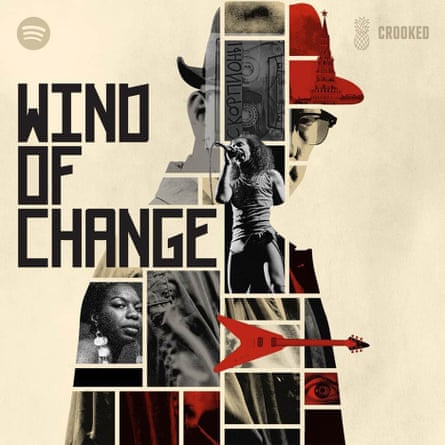With its haunting, whistled refrain and lyrics inspired by Russia slowly thawing under glasnost, Scorpions’ 1990 power ballad Wind of Change became a potent presence in the dying days of the cold war. A creative volte-face for the German group, previously best-known for their Spinal Tap-esque album covers and threat to “rock you like a hurricane”, the song’s rallying call of rapprochement was embraced by eastern Europeans as the iron curtain rusted away. But what if this unlikely twist in the group’s career masked an even stranger truth: that the song was in fact penned by the CIA to destabilise a teetering Soviet Union?
That is the conspiracy theory explored by the Orwell prize-winning US journalist Patrick Radden Keefe in his new podcast, named after the song. Keefe first heard the rumour from one of his contacts in the intelligence community a decade ago, and has been intrigued by it ever since. Looking for a gear-change following the gruelling research for a recent book about Northern Ireland’s Troubles, he decided to make a series about it. “I imagined it being like some big international spy thriller, if it had been directed by the Coen brothers,” he laughs. Indeed, Wind of Change quickly develops a gripping – if faintly absurd – narrative, as Keefe chases clues from the US to Russia, parties with fans at a Scorpions concert in Kiev, and tries to get veteran CIA operatives to break protocol and confirm whether or not America’s elite espionage force had a budding songwriter among its ranks.
While he concedes that this particular alleged operation seems small fry “when you set it alongside CIA-assisted coups or targeted assassinations or torture”, at the time the stakes were high. “In 2020, we look back and are like: ‘Of course the Berlin Wall was going to fall, of course the Soviet Union was going to collapse,’” he says. “But people in the CIA at the time didn’t take that for granted at all. There was a sense that the Soviet Union was going to last for ever, and the CIA needed to do everything they could to undermine that.”
This meant using every weapon within its arsenal – including that most American of cultural exports: heavy rock. “Soviet officials had long been nervous over the free expression that rock stood for, and how it might affect the Soviet youth,” Keefe says. “The CIA saw rock music as a cultural weapon in the cold war. Wind of Change was released a year after the fall of the Berlin Wall, and became this anthem for the end of communism and reunification of Germany. It had this soft-power message that the intelligence service wanted to promote.”
Rock’s alluring glamour ensured there was an audience in the eastern bloc hungry to consume this message. “You couldn’t buy western music in record stores, only via the black market, and you could get into a lot of trouble for listening to a band like Scorpions,” Keefe explains. “I interviewed people in Moscow and St Petersburg who’d risked arrest. That song meant a lot to them.”

But would their connection to Wind of Change be cheapened if it turned out to have been cynically cooked up by the other side? “That’s one of the questions we investigate: what does it mean for the listener, to learn that a song might not have been a pure expression of the artist’s feelings but a piece of political propaganda?” says Keefe. “But I don’t think the CIA confected the sentiments in Wind of Change; there was a sense of exhaustion within the Soviet bloc, which helped bring about the change. The song reflected that, and also intensified that emotion, which is what the CIA would have wanted.”
Along his quest for the truth, Keefe uncovers a secret history of artists, film-makers and musicians collaborating with America’s espionage services, with characters as unlikely as Louis Armstrong, Nina Simone and hippy-era folk-rockers the Nitty Gritty Dirt Band “intersecting with the worlds of politics and espionage in ways that were totally mind-blowing to me”.
Inveigling himself within this disorientating world of propaganda designed to seem like anything other than propaganda, Keefe began to experience what he dubs “the ‘hall of mirrors’ effect. I’d uncover a new piece of information that made me re-evaluate things I thought I knew. I was asking myself: ‘Am I paranoid? Am I seeing shadows where there’s nothing?’ Hopefully, in the podcast, the listener is having similar experiences, hearing interviewees reveal these weird things and asking: ‘Are they lying? Can I trust them?’”
It is clear that Keefe relishes keeping his audience lost within the mystery for as long as possible, reluctant to reveal any spoilers over what his investigation has uncovered, and even refusing to confirm whether he got the chance to interrogate any Scorpions along the way. He would probably make a good CIA agent.
The sense that nothing is what it seems chimes with our times. “The whole time we were working on the series, the news was full of reports about Russian influence operations during the 2016 US election,” agrees Keefe. “These themes of propaganda, conspiracy theories and what is the truth find some interesting echoes.” Whether our current age of conspiracy turns up a tale as unlikely as the hair metallers who scored a hit from a piece of CIA propaganda remains to be seen.
Wind of Change is available in full on Spotify, with episodes available weekly on other podcast platforms

Comments (…)
Sign in or create your Guardian account to join the discussion